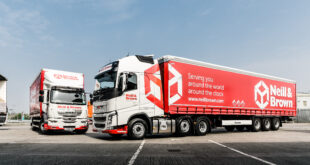In years to come, several truckmakers will be investing in ’self-driving trucks’. But how will this development affect the position of drivers, and will self-driving trucks in fact make your company more ‘climate-neutral’?
Truckmakers like Mercedes-Benz have already been making considerable progress experimenting with private cars and self-driving features. Whereas in the United States cars like these are by now permitted on certain roads, this surely will take a while for countries like the Netherlands. Nonetheless, the advance of this technology did not go unnoticed with truck several manufacturers like Mercedes-Benz. In years to come, Mercedes will be testing a progressive concept named Future Truck 2025. As its name implies, Mercedes intends to have this truck operational and suitable for use on Europe’s motorways by 2025. On the occasion of the Hannover IAA truck trade fair, Mercedes gave a public demonstration of this new project. Future Truck is fully capable of pursuing a route independently, allowing its driver time to schedule, plan its successive route or contact the unloading site, truck ferry or terminal. However, the question remains if this is (to be) considered as belonging to the drivers’ tasks, or if this development will result in in-house planners no longer being able to use their true expertise, namely backing their drivers.
It will turn out more interesting to find out whether self-driving trucks are in fact more climate-neutral than their present counterparts. According to a survey of Dutch scientific research institute TNO , self-driving trucks will produce many benefits by way of ‘clean’ running and 10 to 20 per cent reduced fuel consumption. Initially, this reduction will only be attained during convoy trips, or ‘running-in-line’. The remaining profit lies in a reduced need for manpower, lower CO2-emissions and improved traffic flows. Considering the current state of affairs, it will take some time for the transport world to herald the general introduction of self-driving trucks. Initially, ‘running-in-line’ will turn out interesting on short and regular routes as are frequent in industrial areas like the Dutch Botlek district.
Until this prospect has materialised there is a range of (online) tools available, like DKV Maps or the DKV Card, helping haulage and logistics firms reduce their costs and operate along CO2-conscious lines.
You drive, we care.
 DKV BeNeLux You drive, we care
DKV BeNeLux You drive, we care


